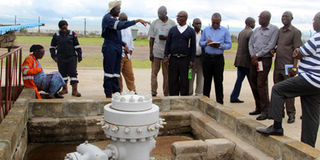Prime
CNOOC seeks approval to develop oil fields

Inspection. Bunyoro Kitara Kingdom officials at Kingfisher oil field. CNOOC wants to develop the oil field for commercial oil production. PHOTO BY FRANCIS MUGERWA
What you need to know:
- The CNOOC Uganda vice president, Mr Cu Yujun, said management plans are in place to tackle cultural heritage, health, traffic, biodiversity, population influx and other emerging issues of the project.
China National Offshore Oil Corporation (CNOOC) Uganda Ltd, a Chinese firm licensed to operate the Kingfisher oil field in Kikuube District, has submitted its Environmental and Social Impact Assessment (ESIA) report to government in its bid to obtain approval to kick off commercial oil developments in the area.
CNOOC Uganda contracted Golder Associates and Eco and partners to conduct an ESIA study on the Kingfisher oil development project, a pre-condition before National Environment Management Authority’s (Nema) approval for the project’s commencement.
The CNOOC Uganda senior public relations supervisor, Ms Aminah Bukenya, said the ESIA is meant to provide relevant government authorities and stakeholders with sufficient information on the Kingfisher oil development project so that an informed decision for approval on environmental and social aspects of the project can be made.
“We are seeking approval to commence implementing the project after the final investment decision is made. We are committed to comply with the oil industry best practices and International financial compliance in all our operations,” Ms Bukenya said.
During two public hearings that were organised by the Petroleum Authority of Uganda (PAU) on Wednesday and Friday at Rwemisanga and Kabaale primary schools, respectively, locals and leaders asked the government and oil companies to enhance environmental protection, improve community livelihoods and enhance community benefits from oil projects.
The Hoima District chairman, Mr Kadiri Kirungi, observed during the meeting that those affected by the oil projects must be empowered with financial literacy skills to improve their livelihoods.
“People who were displaced in land earmarked for the oil refinery received a lot of money as compensation. Today, they are the poorest in the district because they misused the money,” he said.
He asked government and oil companies to give primary consideration for jobs and businesses to communities hosting oil developments so that they benefit more than other Ugandans.
“Poverty has hit us despite having these projects. Please change and give us economic benefits. If you don’t change, change will change you,” he said.
Residents also demanded for government’s affirmative action on land ownership challenges.
“Speculators are grabbing land which has pushed some of us to wetlands and forests for survival. If a person’s land is grabbed, he will not fail to encroach on a wetland or forest to search for food for his family,” Mr Daniel Muhairwe, the Buhaguzi County MP, said on behalf of his constituents.
He asked government to implement systematic land demarcation and titling to give titles to customary land owners, who are being displaced from their land by speculators who are said to be fraudulently obtaining titles.
Prof Grace Bantebya was the presiding officer at the hearings that were attended by hundreds of locals, who will be affected by the project, local leaders, government technocrats and cultural leaders.
Cultural concerns
“Like it has been with other infrastructural projects in the kingdom, we expect a huge population influx in the area which could erode our language and other cultural values. We need adequate safeguards of protecting our culture and cultural sites” Mr Bruhan Kyakuhaire, a special assistant for culture in Bunyoro Kitara Kingdom, said.
He said there is need to safeguard the land rights of the local communities affected by oil projects.
The Kingfisher ESIA report states that during the development of the project, there is a risk of water, soil and air pollution, degradation of vegetation, displacement of people and disturbance of previously unidentified cultural sites.
Oil developer confident
The CNOOC Uganda vice president, Mr Cu Yujun, said management plans are in place to tackle cultural heritage, health, traffic, biodiversity, population influx and other emerging issues of the project.
He said the project is economically, environmentally and technically feasible.
He said CNOOC Uganda will optimise employment of Ugandans in technical fields of oil and gas, promote the utilisation of Ugandan goods and services, promote enterprise development, technology transfer to Ugandans and Ugandan companies and mitigate negative impact of the project and comply with Ugandan laws and policies to conserve the environment.



